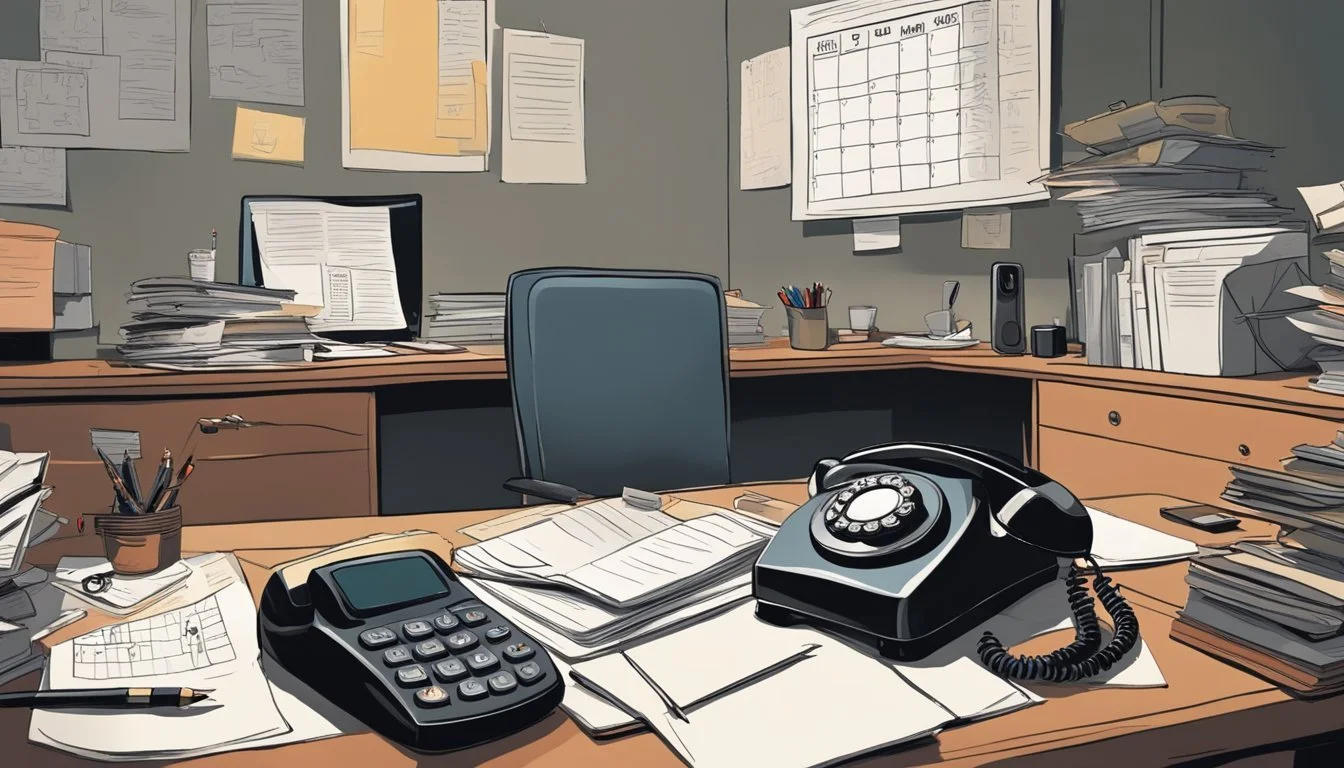15 Red Flags That Your Relationship Is Built on Mistrust and Suspicion
Key Indicators to Watch Out For
Trust forms the foundation of any healthy relationship. When trust is compromised, it not only erodes the bond between partners but also leads to a constant atmosphere of suspicion and doubt. Identifying potential red flags can help in understanding whether the relationship is struggling with hidden trust issues.
Recognizing these warning signs early on is crucial for addressing and resolving underlying problems. By being aware of the indicators of mistrust, individuals can take proactive steps to either mend their relationship or make informed decisions about its future.
1) Constantly checking each other's phones
Constantly checking each other’s phones is a significant red flag in a relationship. It indicates a lack of trust and can lead to feelings of resentment and insecurity.
One partner may feel the need to monitor the other’s activities, leading to a cycle of suspicion and doubt. This behavior can erode the foundation of trust that a healthy relationship requires.
Privacy is essential in any partnership. When couples constantly check each other's phones, it violates personal boundaries and creates an atmosphere of surveillance and control. Instead of fostering intimacy and understanding, it leads to arguments and misunderstandings.
Partners who frequently check each other's devices may develop anxiety and stress. This behavior can create an unhealthy dynamic, where one or both partners feel they must hide aspects of their lives to avoid conflict.
Constant phone checking can also signal deeper issues within the relationship. Addressing these underlying problems, such as communication breakdowns or past infidelities, is crucial.
For more on common challenges in relationships, visit the 15 Red Flags in Relationships article.
2) Often Questioning Whereabouts
Constantly questioning a partner's whereabouts can signal serious trust issues. This behavior may indicate underlying insecurities or past experiences that have fostered distrust.
A partner who regularly inquires about every detail of the other's day may be seeking control. This scrutiny often stems from a place of fear, not genuine care.
Frequent questioning can lead to a feeling of being monitored. It shifts the dynamic from a healthy relationship to one of interrogation, eroding trust over time.
In some cases, this behavior manifests as a response to hidden insecurities about the relationship. Individuals may feel that knowing every movement will prevent betrayal or deceit.
This pattern can create tension and foster resentment. Over time, it may push the partner away, causing the very mistrust it aims to prevent.
Addressing the root causes of this behavior is crucial. Open conversations about the need for space and trust can help recalibrate the relationship's dynamics.
Ignoring this issue can lead to further escalation. It’s essential to recognize the signs early and work towards building a foundation of mutual trust and understanding. For more insights, explore red flags in relationships.
3) Inconsistent Stories
When one partner notices that their significant other frequently provides inconsistent stories, it raises serious concerns about trust. For instance, if the details about a night out with friends change or the explanation for a missed call varies, these inconsistencies can be troubling.
Such discrepancies might suggest that the person is hiding something or isn't being fully honest. Over time, this behavior erodes trust and creates a sense of uncertainty. The affected partner may start to question all aspects of the other's actions and words.
Inconsistent stories also make it difficult to build a solid foundation of trust. Trust relies on predictability and reliability. When stories and explanations don't match up, it becomes hard to feel secure in the relationship.
This pattern can lead to increased suspicion and anxiety. The partner on the receiving end might constantly wonder if they’re being lied to or misled. This constant doubt is unhealthy for both individuals and can be detrimental to the relationship's stability.
Addressing this issue typically requires open communication. Both partners need to commit to honesty and transparency to rebuild trust. Consistent and truthful communication is key to overcoming this red flag.
4) Frequent jealousy
Frequent jealousy can be a significant indicator of underlying trust issues in a relationship.
While occasional jealousy may show affection, excessive jealousy suggests deeper problems. Constantly questioning a partner's actions or intentions highlights a lack of trust.
Jealousy often begins subtly but can escalate quickly. It can lead to controlling behaviors and unnecessary arguments.
Persistent jealousy may manifest through frequent accusations. Partners might check each other’s phones or social media excessively.
This behavior creates an environment of suspicion and anxiety. Over time, it erodes the foundation of trust necessary for a healthy relationship.
In addition to emotional strain, frequent jealousy can cause psychological distress. Anxiety and insecurity can become prevalent for both partners.
Seeing frequent jealousy as a red flag is essential. It helps recognize the need for deeper communication about insecurities and trust issues.
For more on the impact of jealousy and its signs, you can refer to Ideapod's article on hidden trust issues.
Understanding these indicators can guide couples in addressing and resolving underlying issues.
5) Unexplained Absences
Unexplained absences are a significant red flag in any relationship. When a partner often disappears without a reasonable explanation, suspicion and mistrust can grow. This behavior can disrupt the sense of security essential for healthy relationships.
Consistent patterns of disappearing acts can make the other person feel disconnected. Trust erodes as questions go unanswered, leading to an emotional gap. This can leave the person feeling unsupported and neglected.
Sometimes, unexplained absences may indicate underlying issues. These could range from personal problems to possible infidelities. Addressing the issue openly is crucial to understanding the root cause and finding a resolution.
If a partner is persistently absent without a reason, it may suggest they are either avoiding something or hiding information. The frequency and duration of these absences can significantly impact how much trust remains in the relationship. Unresolved and repeated occurrences can gradually damage the foundation of trust.
Those experiencing this should have a direct and honest conversation. If explanations remain vague or inconsistent, it can further confirm suspicions. This pattern can signal deeper underlying problems that need to be resolved for the relationship to move forward in a healthy manner.
6) Hiding financial details
When a partner begins to hide financial details, it can indicate deeper trust issues within the relationship. Secrecy around bank accounts, credit cards, or expenditures can lead to significant conflicts and a sense of betrayal.
A partner who is not transparent about their finances may be attempting to conceal debts, spending habits, or even a hidden lifestyle. Such behavior can strain the relationship and create a foundation of mistrust.
Financial control or deceit often stems from a lack of trust. It's crucial for both partners to maintain open communication and shared decision-making around finances. Transparency in this area is essential for building a secure and trusting relationship.
If one consistently avoids discussing financial matters or becomes defensive when questioned, this can be a red flag. This kind of secrecy can create suspicion and anxiety, undermining the relationship's stability.
For more information on financial red flags, consider reading about how having secret accounts or credit cards can signal dishonesty in financial matters. Being aware of these signs can help partners address issues before they become insurmountable.
7) Secretive behavior
Secretive behavior in a relationship can signal serious trust issues. When one partner consistently hides details about their activities, plans, or communications, this secrecy can breed suspicion and doubt.
Lying by omission or avoiding certain topics can indicate a lack of openness. Such behavior often raises questions about what else might be hidden, eroding the foundation of trust.
Secretive financial habits, like hidden purchases or undisclosed debts, also create mistrust. Transparency in financial matters is essential for a healthy partnership.
Avoiding social situations or not introducing their partner to friends and family can be another red flag. This behavior might suggest the person is hiding aspects of their life or relationships from their partner.
Secretive behavior may extend to technology use. Hiding phone screens, deleting messages, or using secretive apps can all hint that something is being concealed. This can lead to further distrust and increased insecurity in the relationship.
Consistent secretive behavior damages open communication and honesty. Addressing these issues early on is crucial to maintaining a healthy and trusting relationship.
For more insights on secretive and dishonest behavior, you can visit this resource.
8) Evasive Answers
When a person consistently provides evasive answers, it may indicate issues with trust. Evasive responses can be characterized by avoiding direct answers to questions, changing the subject, or giving vague replies. This can create a sense of unease and suspicion in the relationship.
Evasive behavior can stem from an unwillingness to share personal information or feelings. This lack of transparency may cause the other partner to feel excluded and uncertain about the relationship's stability. Over time, such patterns can erode trust and intimacy.
In some cases, evasive answers may be a result of fear. One partner might fear confrontation or the consequences of being honest. This can lead to a cycle of avoidance and mistrust, making it difficult for the relationship to progress healthily.
Repeated experiences of evasiveness can cause a partner to doubt the other's intentions. Honesty and openness are crucial for building a solid foundation in any relationship. When one partner continuously avoids straightforward communication, it signifies a deeper issue that needs addressing.
Addressing this behavior involves open dialogue about the importance of honest communication. Both partners need to feel safe and valued to overcome the barriers that lead to evasive answers. For more on this, check the detailed descriptions on 1 and 2.
9) Sudden Mood Changes
Sudden mood changes can be a significant red flag in a relationship. These fluctuations might indicate underlying mistrust or unresolved issues between partners.
Unexpected shifts from happiness to anger or sadness can suggest insecurity or suspicion. When a partner’s mood changes abruptly without apparent reason, it might signify hidden doubts or fears within the relationship.
Such emotional volatility can create a sense of instability. It can lead to an environment where one partner feels they must constantly walk on eggshells, unsure of what might trigger the next mood swing.
Mood swings can be confusing and distressing for both partners. If sudden mood changes become frequent, it may be essential to address the root causes together. This could involve open communication or seeking the help of a professional counselor.
Significant mood changes are often a symptom of deeper issues. When not addressed, these issues can erode the foundation of trust, leading to further complications and misunderstandings.
Partners should recognize when mood changes are persistent and seek ways to address and resolve the underlying concerns. Identifying the triggers can be the first step in rebuilding a stable and trusting relationship.
10) Avoiding Important Discussions
Avoiding important discussions in a relationship can be a significant red flag indicating underlying mistrust or unresolved issues.
When one partner consistently sidesteps serious conversations, it may suggest a reluctance to confront difficult truths or fears about the relationship's stability.
This behavior can manifest as changing the subject, making excuses, or physically leaving the room.
Frequent avoidance of essential topics undermines open communication. Over time, unresolved issues can build up, leading to resentment and further mistrust.
It's crucial to recognize this pattern early and address it to prevent long-term damage.
11) Lack of Future Plans
When a partner consistently avoids discussions about the future, it may indicate underlying trust issues. Planning a future together often signifies commitment and security.
Reluctance to discuss moving in, marriage, or other long-term goals can be worrisome. It may signal hesitance or doubt about the relationship's stability.
This avoidance can create uncertainty and strain. If one partner desires to plan ahead while the other hesitates, it may reflect deeper, unspoken concerns.
Discussing future plans reinforces mutual goals and trust. When these conversations are missing or deferred, it can suggest a lack of investment in the relationship's longevity.
Individuals in committed relationships typically envision shared futures. Avoiding these discussions might indicate fears or reservations about the relationship’s direction.
Addressing the reluctance to plan can help identify any deep-seated issues. Open and honest communication is key to understanding the reasons behind the avoidance.
12) Feeling Distant
Feeling distant from a partner can be a significant red flag in a relationship. When one person consistently feels emotionally removed, it can point to deep-seated trust issues.
Emotional distance might manifest as a lack of communication or a reluctance to share personal thoughts and feelings. This distancing behavior can create a noticeable gap between partners.
A relationship thrives on mutual understanding and closeness. When distance creeps in, it might be because one partner feels unsafe or unsure about the other. This hesitation often indicates underlying mistrust.
Interactions may become more superficial. Instead of engaging in meaningful conversations, the exchanges may focus only on mundane topics. This shift can be a sign that emotional walls are being erected.
A partner who feels distant may also avoid physical closeness. They might shy away from intimate gestures, such as holding hands or embracing. This physical avoidance reflects deeper emotional and trust issues.
When noticing signs of distance, it's important to address them promptly. Open and honest conversations can sometimes bridge the gap. Recognizing these signs and taking proactive steps to reconnect can be crucial in rescuing a relationship from further deterioration.
13) Canceling plans frequently
Frequent cancellation of plans can be a significant red flag in relationships. It might indicate that one partner is not prioritizing the other, causing feelings of neglect. When this happens consistently, it can foster distrust and insecurity.
A partner may cancel plans due to a lack of interest or commitment. If someone rarely follows through on agreed plans, it raises questions about their dedication to the relationship. This can be interpreted as a sign that they do not value their partner's time.
Moreover, frequent cancelations can erode trust. The affected partner may begin to suspect other motives behind these cancellations, such as spending time with someone else or hiding certain activities. This doubt can further strain the relationship.
Over time, consistently canceled plans can create a pattern of unreliability. It becomes challenging for the affected partner to rely on their significant other for support or companionship. This unreliability can lead to resentment and emotional disconnect.
Communication is key in addressing this issue. If canceling plans becomes a habit, it is vital for partners to discuss their feelings and reasons. Understanding each other's perspectives can help mitigate misunderstandings and rebuild trust in the relationship.
14) Defensive Reactions
Defensive reactions are a significant red flag in relationships. When a person constantly deflects blame or avoids accountability, it indicates a deep-seated trust issue. This behavior stems from an inability to confront personal flaws and vulnerabilities.
Such reactions often involve counterattacks. Instead of addressing the issue at hand, the defensive partner may turn the accusation back onto the one raising concerns. This tactic not only shifts focus but also undermines open communication.
Frequent defensiveness erodes trust. The partner seeking resolution feels unheard and invalidated. Over time, this can lead to a breakdown in emotional intimacy and mutual respect.
Moreover, repeated defensive behaviors can create a hostile environment. The relationship becomes a battleground rather than a supportive partnership. This hostility prevents the development of healthy, constructive dialogues.
Understanding these defensive patterns is crucial. Recognizing them early can help partners address underlying issues before they result in irreparable damage. For further insights, read more here.
15) Excessive possessiveness
Excessive possessiveness is a major red flag in any relationship. Possessiveness can initially be mistaken for deep affection or care.
However, it often leads to emotional control and manipulation. A possessive partner may attempt to restrict their partner's interactions, choices, and activities. They may frequently ask about their partner's whereabouts or question their relationships with friends and family.
This behavior can create significant tension. It can also result in the possessive individual feeling even more insecure. Over time, this dynamic can erode trust and mutual respect in the relationship.
Addressing excessive possessiveness requires open communication and effort from both partners. Recognizing this behavior as a sign of deeper issues is the first step towards building a healthier and more trusting relationship. More information on dealing with possessiveness can be found here.
Understanding Mistrust and Suspicion in Relationships
Mistrust and suspicion can seriously damage a relationship, creating a barrier to healthy communication and emotional intimacy. Recognizing and addressing these issues is crucial for nurturing a positive and secure partnership.
Defining Mistrust and Suspicion
Mistrust involves a lack of confidence in a partner's reliability and intentions. It often stems from past betrayals, inconsistent behavior, or secrecy. Partners experiencing mistrust may constantly question the other's actions and motives, seeking reassurance through repeated inquiries or surveillance.
Suspicion tends to be rooted in unfounded fears or anxiety. It leads to excessive questioning, unwarranted accusations, and assumptions of deceit. This behavior can create a toxic cycle where the suspicious partner's insecurity perpetuates more defensive or secretive behavior in the other.
Psychological Impact of Mistrust
Mistrust can cause significant emotional stress for both partners. The partner who feels mistrusted might develop feelings of frustration, emotional exhaustion, and resentment. They might feel constantly under scrutiny, which can lead to reduced openness and intimacy.
For the partner experiencing suspicions, the impact includes heightened anxiety and an inability to fully enjoy the relationship. Persistent doubt can lead to chronic stress, low self-esteem, and social withdrawal. This psychological strain often magnifies relational conflicts and diminishes mental well-being. Persistent mistrust can also contribute to depression and anxiety disorders, further complicating the relationship dynamics.
Causes of Mistrust in Relationships
Mistrust in relationships often stems from past experiences and issues with communication. Understanding these root causes can help identify and potentially resolve trust issues.
Past Experiences and Trauma
Past experiences and trauma can significantly contribute to mistrust. Individuals who have previously faced betrayal, infidelity, or emotional abuse may struggle to trust new partners. Such experiences leave emotional scars, making it challenging to form secure attachments.
For example, someone who has been cheated on might constantly fear recurrence, leading to suspicion and doubt. Childhood experiences, like witnessing parental infidelity or experiencing neglect, also shape one’s ability to trust. These early traumas create deep-seated fears and insecurities.
Healing from past traumas often requires professional help. Therapy can provide a safe space to process these experiences, understand their impact, and develop healthier relationship patterns. Building trust needs patience, self-awareness, and often, guidance from a therapist.
Communication Issues
Poor communication can erode trust in a relationship. Misunderstandings, lack of transparency, and inadequate expression of feelings can create an environment ripe for mistrust. When partners do not share their thoughts and emotions openly, it breeds suspicion.
For instance, regularly hiding details about one’s day or being evasive about phone calls can be misinterpreted as deceit. Open and honest communication forms the backbone of trust. Effective communication involves not just talking but also active listening, which ensures both partners feel heard and understood.
Improving communication requires deliberate effort. Couples can benefit from setting aside time for meaningful conversations, practicing active listening, and being transparent even about uncomfortable topics. This fosters a culture of trust and mutual respect.
Rebuilding Trust: Steps to a Healthier Relationship
Rebuilding trust in a relationship after a breach requires effective communication and, in some cases, professional intervention. It's important to take actionable steps to address the issues and work towards healing.
Effective Communication Strategies
Open, honest communication is fundamental. Partners need to express their feelings without fear of judgment. This can be facilitated through regular, scheduled conversations, ensuring that both parties have equal opportunity to speak and listen.
Using "I" statements instead of "You" accusations can help in expressing personal feelings without blaming the other party. For example, saying "I feel hurt when..." instead of "You always...". This approach reduces defensiveness and fosters a more understanding dialogue.
Body language plays a significant role. Maintaining eye contact and displaying open body postures can show engagement and empathy. Avoiding distractions, such as turning off mobile devices during discussions, ensures that both partners are fully present and attentive.
Active listening involves not just hearing words but understanding the emotions and intentions behind them. Reflecting back what you’ve heard by summarizing or paraphrasing shows that you value and understand your partner’s feelings.
Seeking Professional Help
Sometimes, professional help is necessary to rebuild trust effectively. Therapists can provide a neutral perspective and facilitate constructive dialogue. Couples therapy sessions can offer techniques and strategies tailored to the specific issues at hand.
Cognitive-behavioral therapy (CBT) is often utilized to address ingrained patterns of mistrust. CBT helps partners understand and change the underlying beliefs and behaviors contributing to trust issues.
In cases of severe betrayal, such as infidelity, professional help is crucial. Therapists can help partners navigate the complex emotions and guide them through a structured process of reconciliation.
Various therapeutic approaches, including individual therapy, can also benefit those struggling with personal trust issues. This helps in addressing any past trauma or deep-seated fears that may be impacting the current relationship dynamics.









